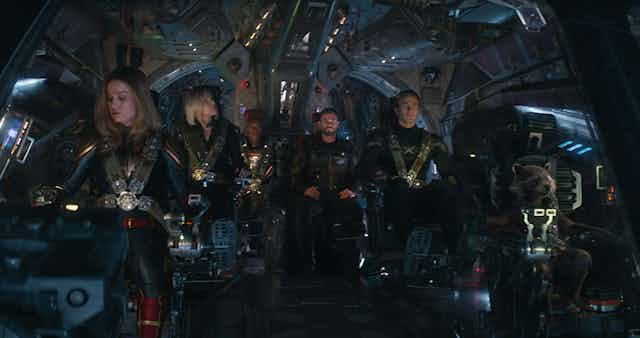There have been more than 90 superhero films since the 1980s and they have become incredibly popular – Avengers Endgame broke box office records in its opening weekend, taking US$1.2 billion worldwide. All the predictions are that it will go on to surpass Avatar’s record as the highest grossing movie of all time.
Superhero movies may be fantasy, but they reflect trends in our society and encourage us to reflect on societal problems such as prejudice and diversity.
The stories can also help shape our development. For example, starting in childhood, creative play is very common – and superheroes have long been staples for children leaning about the social world. Creative play helps us develop several skills – for example learning that other people do not necessarily think in the same way we do. We can then play out how they might respond to a situation and what the outcome of this might be.

We might play out a story where we pretend to be Captain America and follow all the rules, doing what is right. Later we might play a similar story but pretend to be Iron Man and break the rules, doing “what we want”. Regardless of what sort of person we are, we can put ourselves in the shoes of the characters and try out these different roles.
We can also see what happens in the two different stories and reflect on how the others playing with us respond to our actions. This can help us in real-life situations when we need to decide how to behave.
Creative play also teaches us about emotions. When we play creatively, we experience genuine and sometimes strong emotions. For example, we can feel fear when hiding from the villain Thanos – or joy when the crowds cheer as we save New York.
We learn what these emotions feel like, how to label them and how to express them so that others can recognise them. We also learn what verbal and non-verbal signals other people use when they feel angry, upset and excited. These skills help us to develop better relationships with our parents and friends and may even enhance our academic performance.
Goodies and baddies
Even as we get older, role models in films can help us to think about what sort of person we want to be. When we are young, we typically enjoy stories where the “goodies and baddies” are very clear. Happily, the “goodies” usually triumph and the “baddies” get their comeuppance – or are transformed into “goodies”. But as we get older our thinking develops and we understand that the world is rarely black and white and, as a result, our tastes change and we begin to enjoy ambiguous – “grey” – characters who may be “baddies” but may have interesting motives that we can relate to. This links to our stages of moral development. As young children, our sense of morality is tied to avoiding punishment and gaining rewards for being a “good girl/boy”. As we get older we see morality as an agreement between people to maintain social order and everyone’s rights, but we also develop our own personal moral ideals.
Thanos in the Avengers Movies aims to wipe out half of the population of the galaxy. His reasoning is that the galaxy is overcrowded and civilisation will be wiped out if overpopulation continues. By removing half the population at random it means that everyone will have an equal chance of survival, rather than over time, the poorest people being less likely to survive. A key element in lots of superhero stories is “does the end justify the means?”. These situations give us space to reflect on this maxim and our own sense of morality.

Superheroes also often face personal crises and we can look at how they respond, and the consequences of their actions, in order to guide our own behaviour. Many superheroes lose their parents at a young age – and, depending on who they are, they deal with this in healthy or unhealthy ways. They also often have challenging relationships with others. For example Iron Man is not wrong when he says that he is “volatile, self-obsessed, and doesn’t play well with others” and this makes his personal relationship with his partner Pepper, as well as his work relationships within the Avengers difficult.
By following their stories we can learn more about our own ways of coping and those of our friends and family. A bit like creative play in childhood, this helps shape our behaviour.
Power and the glory
Superhero stories also encourage us to reflect on current issues in our society. The focus of these stories therefore changes over generations. For example, X-Men comics dealt with prejudice, becoming popular during the civil rights movement in America. In these stories, mutants born with superpowers encounter prejudice and discrimination.
More recently, many films featuring the Avengers explore the impact of advanced weaponry, capable of destroying entire cities or worlds. In the films a key question is who should decide if, when and how they are used. This reflects issues in our society now.

The fictional worlds in superhero stories create a safe space for us to think about and discuss these issues. For example, reflecting on and discussing real-world prejudice may be challenging, we may like to think that it does not exist nowadays, but exploring this through the treatment of fictional mutant characters may make it easier for us to have an open conversation about it. We may also experience empathy with characters who we see on screen and this may encourage us to take action when we see discrimination in our lives.
Superhero stories have a powerful impact on our development and raise questions important to our society. It is therefore vital that those creating the stories remember that with great power comes great responsibility.

